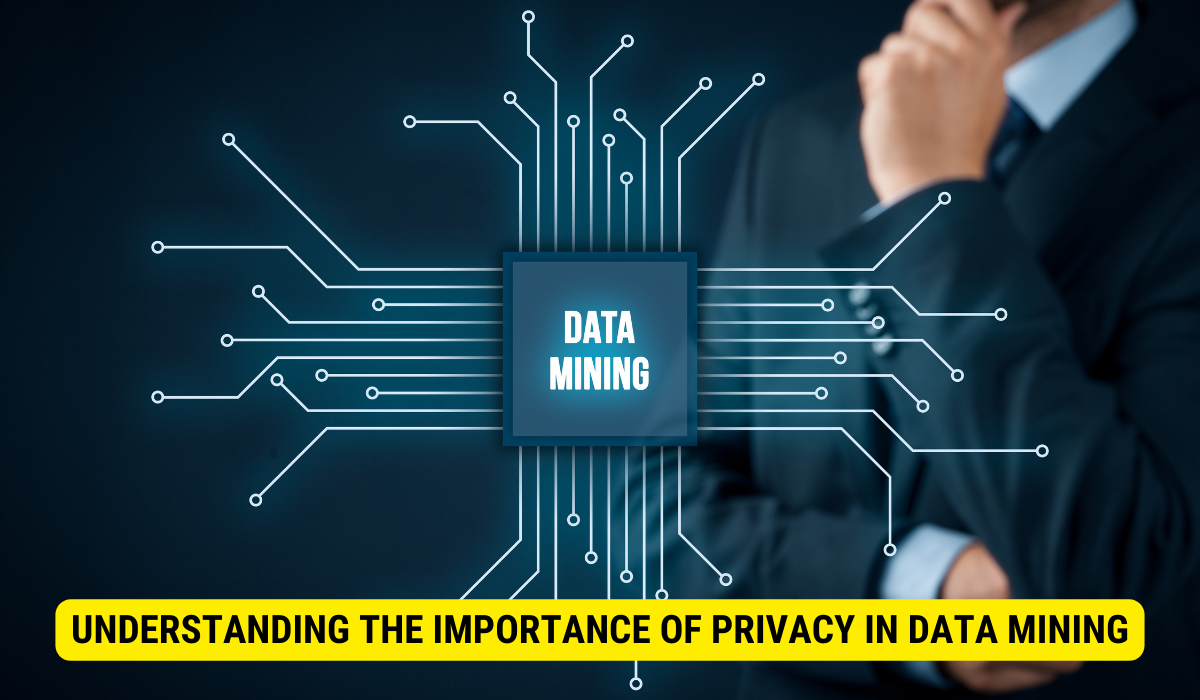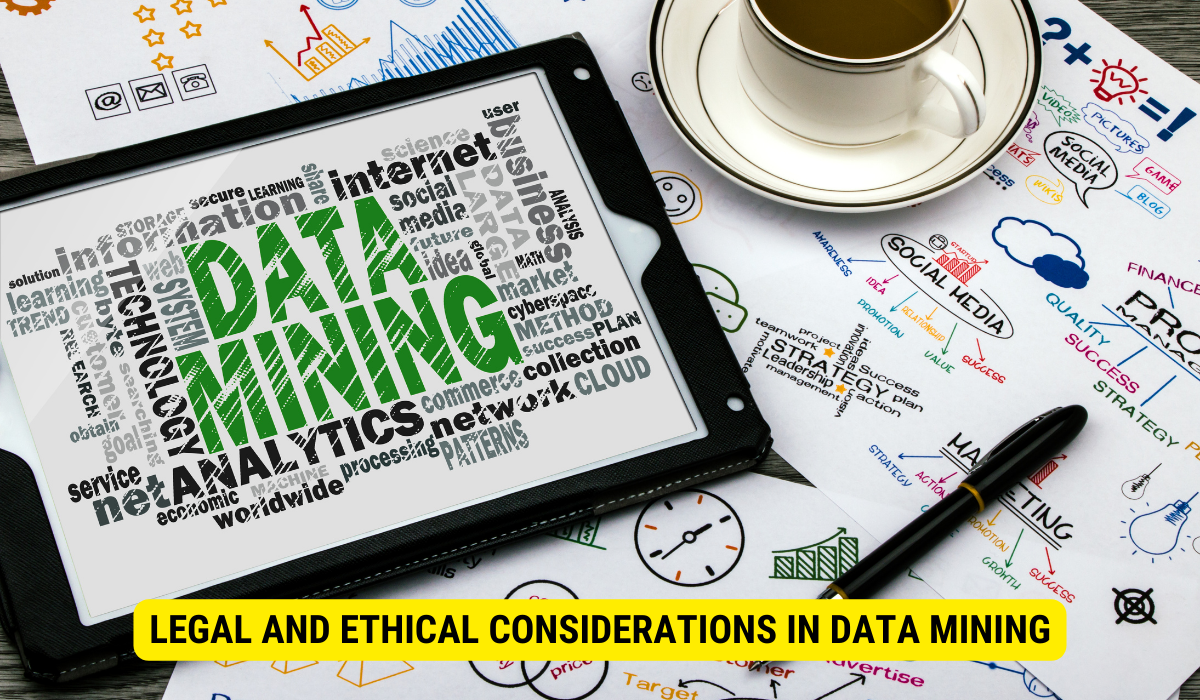To ensure privacy in data mining projects, organizations should create strong privacy policies, use techniques like anonymization and differential privacy, comply with legal standards, and consider ethical implications. These steps are crucial for maintaining trust and respecting individual rights.
Data mining has become integral to today’s digital age, enabling organizations to extract valuable insights from vast amounts of data. However, privacy concerns have emerged with the increasing use of data mining techniques. As data mining involves analyzing large datasets that may contain sensitive information, it is crucial to recognize the importance of privacy and take steps to preserve it. Together, we will discover the implications of privacy in data mining, discuss techniques for preserving privacy, and delve into the legal and ethical considerations surrounding data mining. We will also explore future trends in privacy-preserving data mining.
Understanding the Importance of Privacy in Data Mining
Data mining involves extracting valuable patterns and knowledge from large datasets. However, it also poses potential privacy risks. Privacy refers to the right of individuals to control the collection, use, and dissemination of their personal information. In data mining, privacy encompasses protecting individuals’ sensitive data from unauthorized access or disclosure. Preserving privacy is crucial to maintain trust and confidence in data mining projects.
When it comes to data mining, privacy is not just a mere concept but an important aspect that needs to be carefully considered. The increasing reliance on data mining techniques has increased concern about the potential misuse or mishandling of personal information. Organizations that engage in data mining must be aware of privacy’s ethical and legal implications and take appropriate measures to protect individuals’ data.
One of the key challenges in data mining is striking a balance between the benefits it offers and the potential privacy risks it poses. On one hand, data mining enables organizations to gain valuable insights and make data-driven decisions. It has revolutionized various industries, such as healthcare, finance, marketing, and law enforcement, by uncovering hidden patterns and trends. On the other hand, the extensive collection and analysis of personal data raise concerns about the invasion of privacy and the potential for mismanagement.
Defining Privacy in the Context of Data Mining
Privacy in data mining pertains to safeguarding personally identifiable information or any data that can be linked to an individual. This contains but is not limited to names, addresses, social security numbers, and financial or health-related information. Establishing and enforcing policies that ensure the responsible handling of such data is essential to protect individuals’ privacy rights.
Regarding data mining, privacy is not just about protecting personal information from unauthorized access or disclosure. It also involves ensuring that the data collected is used for legitimate purposes and in a manner that respects individuals’ rights. This means organizations must have clear guidelines and protocols to govern personal data collection, storage, and use.
Moreover, privacy in data mining extends beyond the initial collection and analysis of data. It also encompasses the storage and retention of data and the sharing of data with third parties. Establishments must implement robust security measures to safeguard personal information throughout its lifecycle and ensure that data is only shared with authorized individuals or entities.
The Role of Data Mining in Today’s Digital Age
Data mining has become increasingly prevalent in various domains, including healthcare, finance, marketing, and law enforcement. Organizations can uncover patterns, correlations, and trends leading to informed decision-making and improved services by examining large datasets. However, privacy concerns arise as data mining relies on collecting and analyzing vast amounts of data. It is crucial to strike a balance between harnessing the power of data mining and respecting individuals’ privacy rights.
Data mining is vital in improving patient outcomes and identifying potential health risks in the healthcare industry. By analyzing medical records and genetic data, researchers can identify patterns that help in the early detection and prevention of diseases. However, it is essential to ensure that patient’s personal information is adequately protected and that their consent is obtained before using their data for research purposes.
Data mining enables organizations to detect fraudulent activities and assess creditworthiness in the financial sector. Banks by analyzing transactional data and customer behavior. However, privacy concerns arise when sensitive financial information is accessed and used without individuals’ knowledge or consent. Administrations must implement stringent security measures to protect customers’ financial data and comply with privacy regulations.
Furthermore, marketing data mining is widely used to understand consumer behavior and preferences. Organizations can personalize marketing campaigns and offer targeted products or services by analyzing customer data. However, privacy concerns arise when personal information is collected without individuals’ consent or used for intrusive advertising practices. Organizations must be clear about their data collection practices and allow individuals to opt out of data sharing.
In law enforcement, data mining techniques are employed to analyze large volumes of data, such as criminal records and surveillance footage, to identify patterns and trends that aid investigations. However, privacy concerns arise when innocent individuals’ personal information is collected and analyzed without their knowledge or consent. Law enforcement agencies must adhere to strict privacy guidelines and obtain proper authorization before accessing and using personal data.
In conclusion, while data mining offers numerous benefits, it is essential to prioritize privacy and protect individuals’ personal information. Organizations must establish robust privacy policies, implement stringent security measures, and obey relevant regulations to maintain trust and confidence in data mining projects. By striking a balance between data mining and privacy, we can harness the power of data while respecting individuals’ rights and maintaining a responsible approach to data analysis.
Establishing Privacy Policies for Data Mining
Creating a comprehensive privacy policy is paramount to ensure privacy protection in data mining projects. A privacy policy outlines how an organization gathers, uses, and protects personal information. It should communicate to individuals what data is collected, how it will be used, and who can access it. Furthermore, the policy should outline individuals’ rights concerning their data and establish measures to ensure compliance with privacy laws and regulations.
Creating a Comprehensive Privacy Policy

When developing a privacy policy for a data mining project, it is crucial to involve key stakeholders, including legal experts and privacy professionals. The policy should be tailored to the specific project and organization, considering factors such as the type of data collected, the purposes of data mining, and the intended audience. The policy should also address data retention and disposal and provide methods for individuals to exercise their rights, such as accessing and correcting their data or opting out of data collection.
Implementing and Enforcing Privacy Policies
Having a robust privacy policy is not enough; it must be effectively implemented and enforced. Organizations should educate their employees on privacy policies and best practices. Regular audits and evaluations should be conducted to ensure compliance with the policy and applicable privacy laws. Additionally, mechanisms for individuals to report privacy concerns or breaches should be established, and prompt action should be taken to address any issues.
Techniques for Preserving Privacy in Data Mining
Various techniques can be employed to preserve privacy while conducting data mining projects. These techniques aim to protect individual privacy without compromising the value and accuracy of the data being analyzed.
Anonymization and Pseudonymization Techniques
Anonymization and Pseudonymization are commonly used techniques to preserve privacy in data mining. Anonymization involves removing or altering identifying information from datasets, making linking the data back to specific individuals challenging. Pseudonymization replaces personally identifiable information with pseudonyms, allowing data analysis while protecting individuals’ identities. These techniques help mitigate privacy risks by reducing the possibility of re-identification.
Differential Privacy in Data Mining
Differential privacy is an emerging concept that provides a rigorous framework for privacy preservation in data mining. It focuses on ensuring that the presence or absence of an individual’s data does not substantially affect data analysis outcomes. Differential privacy techniques add controlled noise or perturbation to the dataset, making it difficult to single out individual contributions while still obtaining valuable insights from the data. Differential privacy offers a strong privacy guarantee, safeguarding sensitive information in data mining projects.
Legal and Ethical Considerations in Data Mining
While data mining offers significant benefits, it also raises legal and ethical considerations. Organizations must observe the privacy laws and regulations governing the collection and use of personal information. Failure to obey these laws can result in severe penalties and damage an organization’s reputation. Furthermore, ethical implications arise when data mining involves sensitive or personal information. Organizations must ensure transparency, informed consent, and fair treatment of individuals whose data is being analyzed.
Data Mining and the Law: What You Need to Know
Organizations must familiarize themselves with relevant privacy laws and regulations when conducting data mining projects. These vary across jurisdictions and may impose specific requirements concerning data collection, consent, notification, and security. Engaging legal experts to ensure compliance and mitigate legal risks is essential.
Ethical Implications of Data Mining
Data mining can infringe upon individuals’ privacy and autonomy if not conducted ethically. Organizations must consider the impact of their data mining practices on individuals and society. Transparency and open communication with individuals are crucial in maintaining trust. Furthermore, organizations should ensure that the potential benefits of data mining outweigh any potential harm and that data is used responsibly and fairly.
Future Trends in Privacy-Preserving Data Mining
The field of privacy-preserving data mining is continually evolving, driven by advancements in technology and altering societal norms. Future trends seek to enhance privacy protection while enabling organizations to harness the power of data mining.
Emerging Technologies for Privacy Preservation
New technologies are being developed to enhance privacy in data mining. Methods such as secure multi-party computation, homomorphic encryption, and privacy-preserving data sharing aim to enable collaborative data analysis without compromising privacy. These technologies allow multiple parties to jointly analyze data while keeping the data encrypted or secure, stopping unauthorized access or disclosure of sensitive information.
The Future of Data Mining and Privacy
The future of data mining and privacy is likely to revolve around finding the right balance between data utility and privacy protection. Advancements in privacy-preserving techniques, increased awareness, and legal frameworks offer promising prospects for preserving privacy while extracting valuable insights from data. However, ongoing dialogue among stakeholders, including policymakers, organizations, and individuals, is crucial to shaping the future of data mining and privacy.
Key Takeaways
- Privacy Preservation: Protecting privacy in data mining is paramount. It’s not just about shielding personal data but ensuring its use respects individual rights.
- Balance of Utility & Privacy: Data mining offers valuable insights, but it’s essential to balance harnessing its power and preserving individual privacy.
- Techniques like anonymization, pseudonymization, and differential privacy can protect individual identities and sensitive information during data analysis.
- Legal & Ethical Adherence: Organizations must understand and comply with relevant legal regulations while considering the broader ethical implications of their data mining practices.
- Future of Data Mining: As technology advances, privacy-preserving techniques will evolve, necessitating ongoing stakeholder dialogue to maintain the balance between data utility and privacy.
FAQs
What is the importance of privacy in data mining?
Privacy in data mining ensures the protection of individuals’ sensitive data from unauthorized access or disclosure, maintaining trust and confidence in data mining projects.
What are some techniques for preserving privacy in data mining?
Common techniques include anonymization, Pseudonymization, and differential privacy. They help ensure individual privacy while maintaining the accuracy and value of the data.
Why is a comprehensive privacy policy vital for data mining projects?
A privacy policy outlines how personal information is collected, used, and protected, ensuring compliance with privacy laws and regulations and communicating these practices transparently to individuals.
What are the legal considerations in data mining?
Organizations must adhere to privacy laws and regulations governing personal information collection, use, and protection. The specific laws vary across jurisdictions, and non-compliance can lead to penalties.
How is the field of privacy-preserving data mining expected to evolve in the future?
It will focus on enhancing privacy protection with new technologies like secure multi-party computation and homomorphic encryption while balancing data utility and privacy protection.
Conclusion
In conclusion, preserving privacy during data mining projects is essential to maintain trust and protect individuals’ rights in the digital age. Understanding the importance of privacy, establishing comprehensive privacy policies, employing privacy-preserving techniques, and complying with legal and ethical considerations are vital to ensure privacy protection. With advancements in technology and evolving societal norms, the future of privacy-preserving data mining holds great potential for striking a balance between data utility and privacy preservation.

